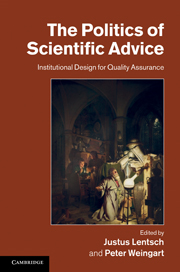Book contents
- Frontmatter
- Contents
- List of figures
- List of tables
- Acknowledgements
- Biographical notes
- Part I Methodological issues: quality control and assurance in scientific policy advice
- Part II Collegial science advisory bodies
- Part III Collegial science policy advisory bodies
- Part IV Research-based advisory organisations
- 10 The industrial organisation of economic policy preparation in the Netherlands
- 11 Quality control for the leading institutes of economic research in Germany: promoting quality within and competition between the institutes
- 12 Quality control and the link between science and regulation from a national and EU administrator's perspective
- 13 Science into policy: The European Environment Agency
- 14 Reflective approaches to uncertainty assessment and communication
- 15 Looking through the telescope – quality assurance in scientific advice to politics
- 16 Scientific policy advice and foreign policymaking – Stiftung Wissenschaft und Politik (SWP), the German Institute for International and Security Affairs
- Part V Academies of science
- Index
12 - Quality control and the link between science and regulation from a national and EU administrator's perspective
Published online by Cambridge University Press: 25 October 2011
- Frontmatter
- Contents
- List of figures
- List of tables
- Acknowledgements
- Biographical notes
- Part I Methodological issues: quality control and assurance in scientific policy advice
- Part II Collegial science advisory bodies
- Part III Collegial science policy advisory bodies
- Part IV Research-based advisory organisations
- 10 The industrial organisation of economic policy preparation in the Netherlands
- 11 Quality control for the leading institutes of economic research in Germany: promoting quality within and competition between the institutes
- 12 Quality control and the link between science and regulation from a national and EU administrator's perspective
- 13 Science into policy: The European Environment Agency
- 14 Reflective approaches to uncertainty assessment and communication
- 15 Looking through the telescope – quality assurance in scientific advice to politics
- 16 Scientific policy advice and foreign policymaking – Stiftung Wissenschaft und Politik (SWP), the German Institute for International and Security Affairs
- Part V Academies of science
- Index
Summary
Introduction
This chapter has to be read against the background of the last five posts of the author spread over fifteen years. I became particularly involved in issues surrounding the scientific input in policy in 1991 when I took over responsibility for health promotion in the UK, and a key issue for us was whether science was properly taken into account in policymaking or whether it was excessively values driven. The issues we were dealing with included alcohol consumption, drug taking and issues including AIDS surrounding sexual behaviour. Subsequently, in 1996, I moved across to the Ministry of Agriculture in the UK taking responsibility for both scientific assessment and risk management. My career continued in this field with the creation of the independent Food Standards Agency, whose Chief Executive I became and, in 2004, I was chosen as Executive Director of the European Food Standards Agency, being then responsible for only risk assessment. Both these bodies were the direct result of the BSE crisis – a subject to which I will return. Finally, since the end of November 2006 I have been the Chief Executive of the British Health and Safety Executive which is responsible for both avoiding accidents in the workplace and promoting occupational health and has both scientific and regulatory responsibilities.
- Type
- Chapter
- Information
- The Politics of Scientific AdviceInstitutional Design for Quality Assurance, pp. 229 - 237Publisher: Cambridge University PressPrint publication year: 2011
- 1
- Cited by

